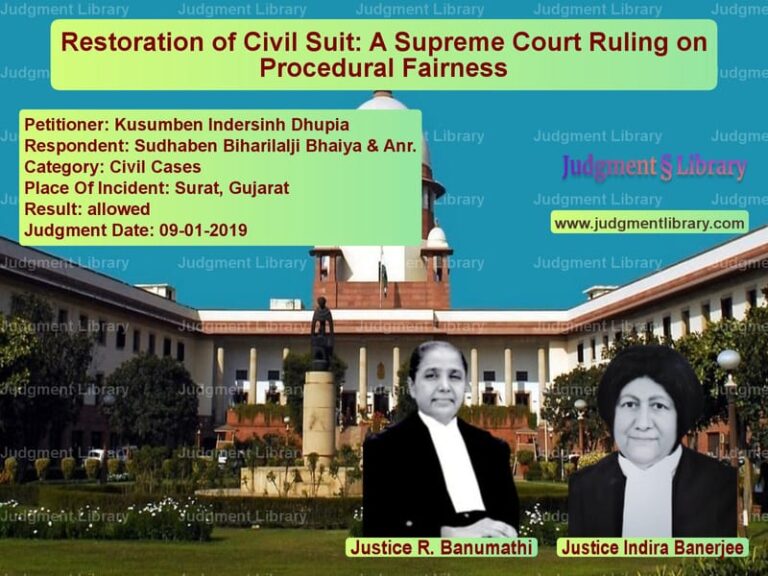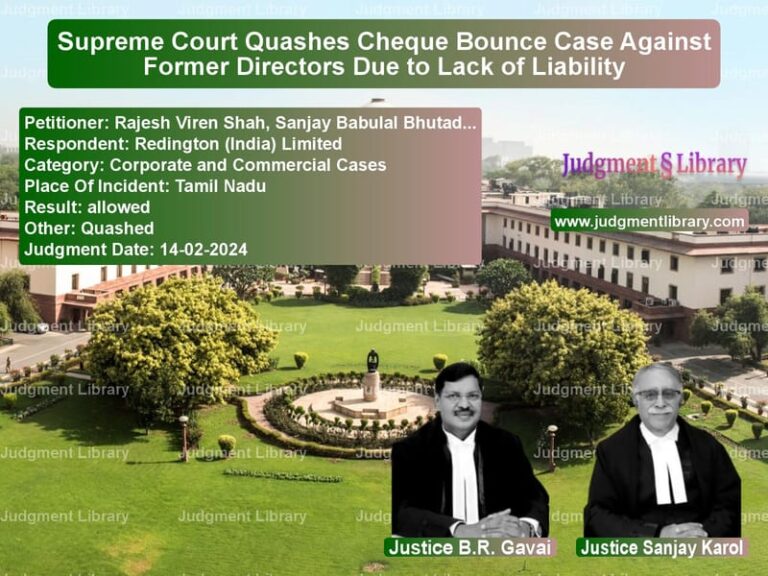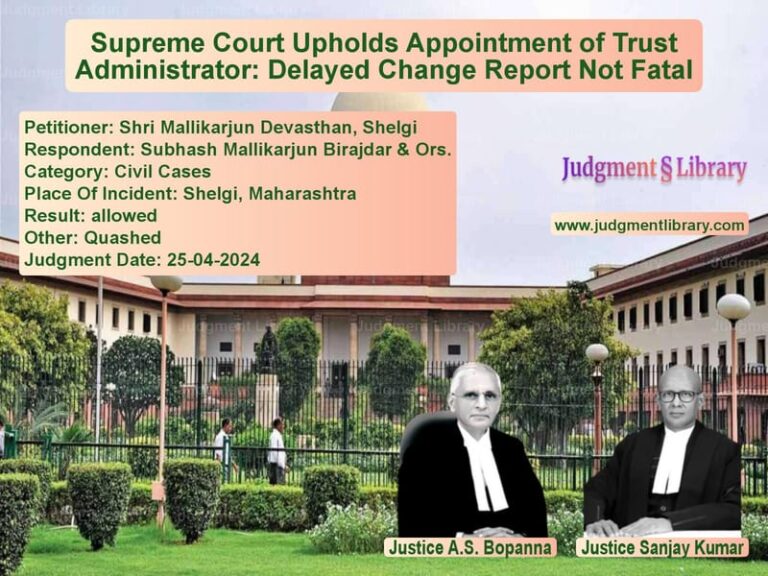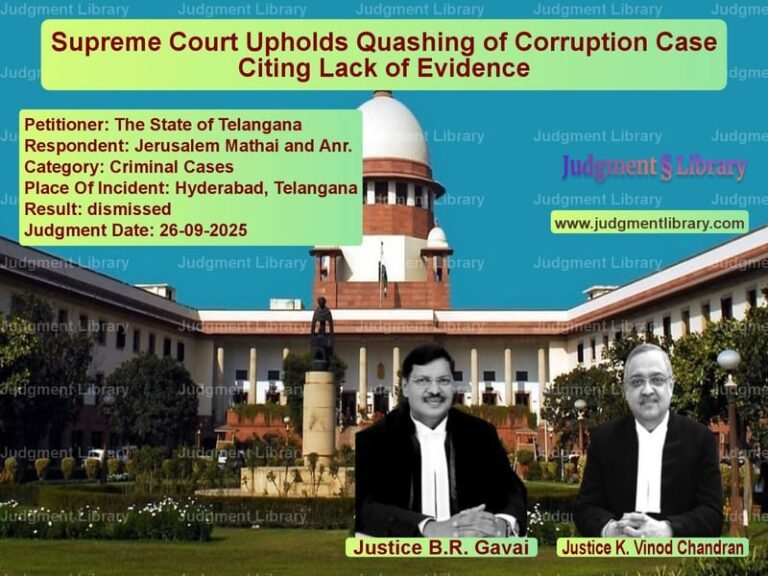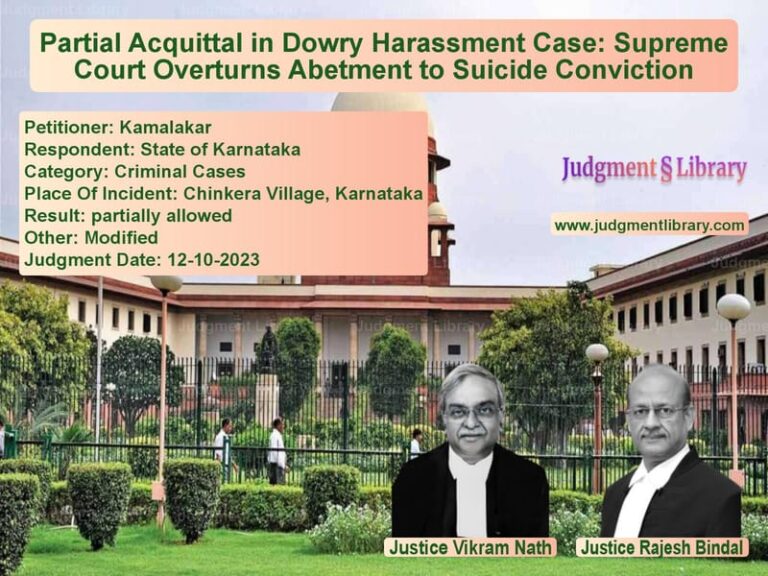Bail Conditions and Victim Compensation: Supreme Court’s Landmark Ruling
The case of Dharmesh @ Dharmendra @ Dhamo Jagdishbhai @ Jagabhai Bhagubhai Ratadia & Anr. v. The State of Gujarat has brought to light an important legal question regarding the imposition of compensation as a condition for granting bail. The Supreme Court of India delivered a landmark judgment on 7th July 2021, clarifying that courts cannot impose victim compensation as a bail condition. This ruling, delivered by a bench comprising Sanjay Kishan Kaul and Hemant Gupta, sets a crucial precedent in criminal jurisprudence.
The case emerged from a violent altercation on 10th November 2019 in Amreli, Gujarat, where two people lost their lives. The police registered FIRs against both parties involved in the fight. The appellants, Accused Nos. 12 and 13, were arrested and later granted bail by the Gujarat High Court with a condition that they must deposit Rs. 2.00 lakh each as compensation for the victims. The appellants challenged this condition before the Supreme Court, arguing that no provision in the Code of Criminal Procedure (CrPC) allows such a requirement at the bail stage.
Legal Question Before the Court
The central legal issue in this case was:
- Whether a court can impose a condition of paying compensation to victims as a prerequisite for granting bail.
Arguments by the Appellants
The appellants’ counsel strongly opposed the imposition of a compensation condition at the bail stage. They contended that:
- The CrPC contains provisions for victim compensation, but these provisions only apply after conviction, not at the bail stage.
- Section 357 of the CrPC clearly states that compensation can be awarded only after a judgment imposing a fine or sentence has been passed.
- Granting bail should be based on the merit of the case, not on the ability of the accused to pay compensation.
- Setting a monetary condition for bail discriminates against those who may not have the financial means to pay.
The appellants cited Palaniappa Gounder v. State of Tamil Nadu, in which the Supreme Court had previously ruled that compensation should be awarded only after considering the nature of the crime, the injury suffered, and the ability of the accused to pay. This requires a trial and cannot be determined at the bail stage.
Arguments by the Respondent (State of Gujarat)
The State of Gujarat defended the High Court’s decision, arguing that:
- The High Court imposed the compensation condition in light of the victim compensation provisions added to the CrPC.
- The compensation condition aimed to provide immediate relief to the victims’ families.
- The accused were involved in a violent altercation that resulted in deaths, making it necessary to ensure that they contribute financially to the victims’ well-being.
However, when asked by the Supreme Court to point out a specific legal provision allowing victim compensation to be imposed as a bail condition, the State failed to provide a clear answer.
Supreme Court’s Observations
The Supreme Court ruled in favor of the appellants and struck down the compensation condition, holding that:
- Compensation to victims must be awarded only after conviction, as provided under Section 357 of the CrPC.
- The imposition of a compensation condition at the bail stage is not supported by any provision in the CrPC.
- Imposing monetary conditions on bail can create discrimination based on financial status.
- While monetary conditions can be imposed in property-related offenses, they should not be used as a mechanism for victim compensation in cases involving violent crimes.
The Court further observed:
“In cases of offenses against the body, compensation to the victim should be a methodology for redemption. However, such compensation can hardly be determined at the stage of grant of bail.”
Final Verdict
The Supreme Court modified the bail conditions and removed the Rs. 2.00 lakh compensation requirement. Instead, the Court imposed the following conditions on the appellants:
- The appellants must not enter the geographical limits of Amreli for six months, except for attending legal proceedings.
- They must regularly mark their presence at the concerned police station.
- The appellants must not attempt to contact or intimidate any witnesses.
With these modified conditions, the appellants were granted bail, and the compensation requirement was struck down.
Impact of the Judgment
This ruling has significant implications for criminal law and bail jurisprudence:
- Ensuring Bail Fairness: The judgment prevents courts from imposing financial burdens on accused persons as a prerequisite for bail.
- Clarifying Victim Compensation: It reinforces that compensation should be awarded post-conviction, not during bail proceedings.
- Preventing Misuse: The decision safeguards against arbitrary conditions being imposed on accused persons at the bail stage.
Conclusion
The Supreme Court’s decision in this case clarifies that courts cannot impose victim compensation as a condition for granting bail. The ruling upholds the principles of justice, ensuring that bail remains a mechanism to secure an accused person’s release based on merit rather than financial capability. The judgment reinforces the idea that victim compensation should be addressed post-conviction, preventing financial burdens from being unfairly placed on individuals seeking bail.
Petitioner Name: Dharmesh @ Dharmendra @ Dhamo Jagdishbhai @ Jagabhai Bhagubhai Ratadia & Anr..Respondent Name: The State of Gujarat.Judgment By: Justice Sanjay Kishan Kaul, Justice Hemant Gupta.Place Of Incident: Amreli, Gujarat.Judgment Date: 07-07-2021.
Don’t miss out on the full details! Download the complete judgment in PDF format below and gain valuable insights instantly!
Download Judgment: dharmesh-@-dharmendr-vs-the-state-of-gujarat-supreme-court-of-india-judgment-dated-07-07-2021.pdf
Directly Download Judgment: Directly download this Judgment
See all petitions in Bail and Anticipatory Bail
See all petitions in Judgment by Sanjay Kishan Kaul
See all petitions in Judgment by Hemant Gupta
See all petitions in allowed
See all petitions in supreme court of India judgments July 2021
See all petitions in 2021 judgments
See all posts in Criminal Cases Category
See all allowed petitions in Criminal Cases Category
See all Dismissed petitions in Criminal Cases Category
See all partially allowed petitions in Criminal Cases Category


